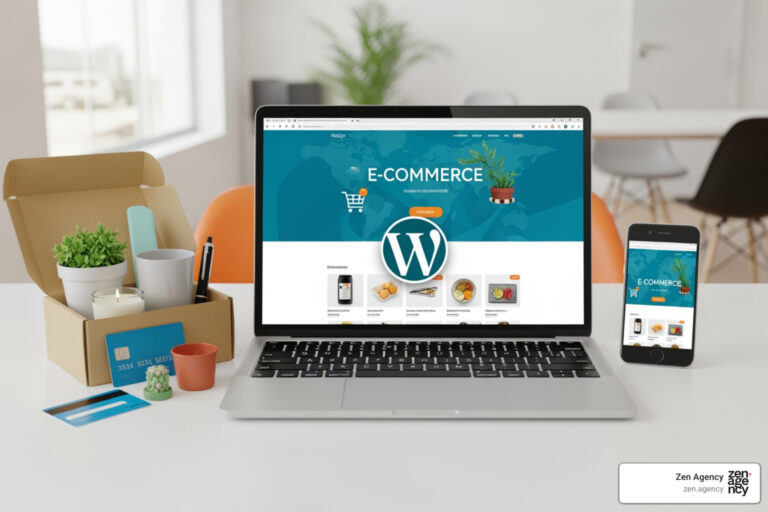The Importance of Regular Website Maintenance for WordPress and WooCommerce
Maintaining a WordPress or WooCommerce website goes beyond launching it and adding content. Regular upkeep is essential to ensure that your website stays secure, performs optimally, and remains up-to-date with the latest features and improvements. Both WordPress and WooCommerce are powerful platforms, but like any software, they need routine maintenance to prevent issues from arising. In this guide, we’ll explore why regular website maintenance is crucial for your WordPress and WooCommerce site and how it can support the long-term success of your business.
Why Regular Maintenance Matters for WordPress and WooCommerce
Whether you run a simple blog on WordPress or a full-scale ecommerce store with WooCommerce, your website plays a vital role in representing your business, driving traffic, and generating sales. However, failing to maintain your website can lead to significant problems over time—ranging from security vulnerabilities to poor performance.
Regular website maintenance by a woocommerce development company ensures that your site runs smoothly and remains secure from the latest cyber threats. It also keeps your site performing well in terms of speed and reliability, which is crucial for retaining visitors and ensuring a positive user experience. For WooCommerce store owners, regular maintenance is even more critical, as downtime or errors can directly impact revenue.
In short, consistent WordPress and WooCommerce maintenance protects your business by keeping your site updated, secure, and optimized for performance.
Security Risks Without Regular Maintenance
One of the biggest risks of neglecting website maintenance is the increased vulnerability to security threats. WordPress and WooCommerce, being popular platforms, are often targeted by hackers and malware. Outdated themes, plugins, or even the core WordPress software can leave your site exposed to cyberattacks, leading to potential data breaches or even site takeovers.
Common Security Threats:
- Malware: If your website’s security is compromised, malware can be injected into your site, affecting its functionality or stealing sensitive data.
- Brute Force Attacks: Hackers often use brute force attacks to gain access to your site by guessing your login credentials. Without security updates and monitoring, your site becomes a prime target.
- SQL Injections: Hackers can exploit vulnerabilities in your site’s code to manipulate databases, potentially stealing or corrupting valuable information.
By regularly updating your WordPress core, plugins, and themes, you reduce the risk of these vulnerabilities. In addition, a good maintenance plan includes ongoing security monitoring and the implementation of protective measures such as firewalls and malware scanning.
Ensuring Optimal Performance
A well-maintained website isn’t just secure—it also runs faster and more efficiently. Performance is a key factor in user experience and directly affects your site’s ability to retain visitors. Slow-loading websites frustrate users and can cause them to leave before even interacting with your content. For ecommerce sites running WooCommerce, slow load times can lead to abandoned carts and lost sales.
How Maintenance Helps Performance:
- Database Optimization: Over time, WordPress databases can become cluttered with unnecessary data, such as spam comments or post revisions. Regular maintenance ensures that your database is cleaned up, improving load times and site performance.
- Caching: A proper maintenance plan includes implementing caching strategies that reduce load times for returning users by serving preloaded versions of your pages.
- Image Optimization: Large image files are often a major contributor to slow site performance. Regular maintenance compresses and optimizes images, helping your site load faster without sacrificing quality.
By focusing on performance optimization as part of your regular maintenance routine, you can improve user experience, reduce bounce rates, and keep your site running smoothly.
Regular Updates for WordPress Core, Plugins, and Themes
One of the most important aspects of WordPress and WooCommerce maintenance is regularly updating the core software, plugins, and themes. These updates are not only necessary for adding new features or improving performance but also for patching security vulnerabilities. Running outdated versions of WordPress or WooCommerce, or even individual plugins, can create security gaps that hackers can exploit.
Why Regular Updates Are Critical:
- Security Patches: Each new version of WordPress and WooCommerce addresses security vulnerabilities discovered in previous versions. Keeping everything updated minimizes the risk of cyberattacks.
- Compatibility: Over time, certain plugins or themes may become incompatible with new versions of WordPress or WooCommerce. Regular updates ensure that everything works together seamlessly and reduces the likelihood of your site breaking after an update.
- New Features and Improvements: Updating your plugins, themes, and the WordPress core also gives you access to new features and performance enhancements, which can improve your site’s functionality and user experience.
A maintenance plan should include regular checks for updates, testing these updates in a staging environment to prevent conflicts, and then applying them to your live site.
Backup Strategies: Protecting Your Data
Regular backups are an essential part of maintaining any WordPress or WooCommerce website. Backups ensure that you have a full copy of your website that can be restored in case something goes wrong, such as a hacking incident, a plugin conflict, or accidental data loss. Without regular backups, a serious issue could result in lost content, customer data, and even entire sections of your website.
Types of Backups:
- Manual Backups: These involve manually saving a copy of your site’s files and database. While useful for one-time backups, they are not practical for ongoing site maintenance.
- Automated Backups: Most maintenance plans include automated daily or weekly backups. Automated backups ensure that your site is backed up regularly without any manual intervention, reducing the risk of data loss.
- Off-Site Backups: It’s important that backups are stored off-site—away from your hosting server. This ensures that even if your server is compromised, you have a safe backup stored securely elsewhere.
Backup strategies should include both local and off-site backups, along with a system for easily restoring your site from a backup in case of emergency. Regular backups provide peace of mind and protect your business from catastrophic data loss.
Managing WooCommerce-Specific Updates and Features
WooCommerce, being an ecommerce platform, requires additional attention compared to a standard WordPress website. As your online store handles sensitive customer data, payment transactions, and inventory management, regular WooCommerce maintenance is crucial to ensure your store operates smoothly, securely, and efficiently. Neglecting updates for WooCommerce-specific features can result in broken functionalities or even legal issues, particularly regarding payment security.
Payment Gateway and Plugin Updates:
WooCommerce stores rely on payment gateways like Stripe, PayPal, or Authorize.net to process customer payments. These payment gateways frequently release updates to enhance security and improve compatibility with WooCommerce. Ensuring that these updates are applied promptly helps prevent payment processing errors and security vulnerabilities. In addition, WooCommerce-specific plugins like shipping calculators or tax management tools need to be updated regularly to avoid conflicts with the WooCommerce core.
Compliance with Legal Requirements:
WooCommerce stores must comply with various legal requirements, such as GDPR (General Data Protection Regulation) or PCI DSS (Payment Card Industry Data Security Standard). Regular updates and maintenance ensure that your store remains compliant with these regulations, protecting you from legal risks.
By focusing on WooCommerce-specific updates and ensuring that your store is fully operational and secure, you can protect both your customers and your business from potential disruptions and security breaches.
Custom Functionality and Scaling Your Website
As your business grows, your website may need to handle more traffic, additional products, or new features. Customizing your WordPress or WooCommerce site and scaling it to meet the demands of your expanding business is another reason why regular maintenance is essential. Without ongoing adjustments and updates, your website may struggle to keep up with the growth, resulting in performance issues or broken functionality.
Adding New Features:
Your business’s needs will likely change over time, whether it’s adding a membership section, integrating a new payment method, or creating personalized product recommendations for customers. With regular maintenance, you can safely implement these new features without worrying about conflicts or errors. Regular maintenance ensures that your WordPress site can accommodate custom features and that your WooCommerce store can integrate smoothly with third-party apps or tools.
Handling Increased Traffic:
As your website attracts more visitors, its performance may be affected, especially if your hosting plan or server resources aren’t optimized for higher traffic levels. Regular maintenance includes performance checks and upgrades to your hosting resources, ensuring that your website remains responsive and functional, even during traffic spikes.
Custom Code Compatibility:
If your website includes custom code, maintaining compatibility with WordPress core updates and plugin updates is critical. Regular code audits as part of your maintenance plan can ensure that any custom functionality remains intact after updates, preventing issues from breaking your website.
By incorporating scalability into your regular maintenance routine, you ensure that your website grows along with your business, providing the flexibility to implement new features and handle increased demand.
Cost-Saving Benefits of Preventive Maintenance
One of the key benefits of regular website maintenance is its cost-saving potential. While it might seem like an unnecessary expense to some, regular maintenance helps you avoid much larger costs down the road. Neglecting updates, security patches, or backups can lead to severe issues that are more expensive to fix than the preventive measures themselves.
Avoiding Emergency Repairs:
When a WordPress or WooCommerce site goes down due to a security breach, plugin conflict, or server crash, emergency repairs can be costly. Not only do you have to pay for technical support to fix the problem, but you also lose revenue during the downtime. Regular maintenance helps prevent these issues by addressing potential problems before they become critical, saving you from emergency repair costs.
Minimizing Downtime:
For ecommerce businesses, downtime directly affects sales. Every minute that your WooCommerce store is down, you lose potential revenue. Regular maintenance, including uptime monitoring and quick responses to performance issues, minimizes the risk of downtime, ensuring that your store remains operational when customers need it.
Extending Website Lifespan:
A well-maintained website can last much longer before needing a full redesign or redevelopment. By addressing small issues early, optimizing performance regularly, and keeping everything up-to-date, you extend the life of your website and avoid the need for costly rebuilds.
Investing in preventive maintenance is a smart business decision that helps you save money by preventing costly emergencies, extending your website’s life, and maintaining steady performance.
Long-Term Success with Regular Website Maintenance
Regular website maintenance is essential for both WordPress and WooCommerce sites to ensure security, performance, and reliability. Whether you’re running a simple blog or a large ecommerce store, neglecting maintenance can lead to significant issues like security breaches, downtime, poor user experience, and lost revenue. On the other hand, a well-maintained site is fast, secure, and able to handle your business’s growth and evolving needs.
By regularly updating your WordPress core, WooCommerce plugins, and security measures, you not only protect your website from cyber threats but also improve its performance, scalability, and SEO. Backup strategies ensure that your data is safe, while preventive maintenance saves you money by avoiding costly emergencies.
Investing in ongoing WordPress and WooCommerce maintenance sets your website up for long-term success, providing a smooth, secure, and user-friendly experience that supports your business’s goals.
Ready to maintain and optimize your WordPress or WooCommerce site? Contact us today to learn more about our maintenance services and how we can help your website thrive.

















